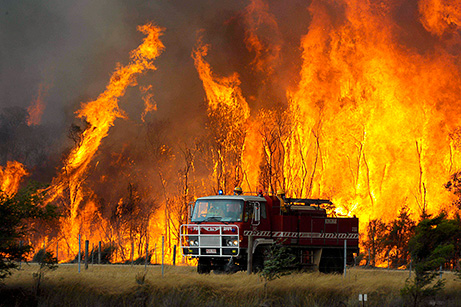The original question was: So I was wondering, and I have pondered it for some time, since fire is a plasma, and plasma is a state of matter. and matter is defined as anything that has mass, would that then mean that fire has mass and weight to it? If so, is there a way to measure its weight? How much space would, say, a pound of fire take up?
Physicist: It weighs more than nothing, but if you’re at the bottom of a pillar of fire, being crushed should be your second concern.
Fires, putting aside details about plasma and chemicals or whatever, is just hot air. For a given pressure the ideal gas law says that the density of a gas is inversely proportional to temperature, in Kelvin. You can use this fact, the temperature and density of air (300°K 1.3 kg/m3), and the temperature of your average run-of-the-mill open flame (about 1300°K) to find the density of fire.
For most “everyday” fires, the density of the gas in the flame will be about 1/4 the density of air. So, since air (at sea level) weighs about 1.3 kg per cubic meter (1.3 grams per liter), fire weighs about 0.3 kg per cubic meter.
One pound of ordinary fire, here on Earth near sea level, would take up a cube about 1.2 meters to a side. The reason that fires always flow upward is that its density is lower than air. So, fire rises in air for the same reason that bubbles rise in water: it’s buoyant. Enterprising individuals sometimes even take advantage of that fact.
If you were on a planet with no air at all, fire would fall to the ground instead of rise because, like all matter, it’s pulled by gravity. Also, it would be hard to keep the fire going (what with there being no air).









Note: Do not attempt to pick up fire regardless of how light it is without the appropriate safety equipment.
Benefit using Integral (Math) in our life style
Now, what about particulates in the flames? Whilst it would obviously depend on what is burning, I’d imagine that a 10m column of flame from a gas release pipe on an oil rig would weigh less than a 10m column of flame from, say, a pine forest going up.
Whether this is negligible is yet another question
i want go against the 1st question it is written that fire is a plasma but plasma is only formed when gas is cooled at a certain pressure
So if fire weighs .3 km then how much mass does it have?
Degrees kelvin? Does not compute.
this article is purely skeptical I quote: fire PUTTING ASIDE plasma chemicals and stuff
seriously that’s like saying fire if you only look at the hot air is just hot air.
no fire is enegry because when electrons goes to excited state then light emits ds is fire , so it have not mass
Any suggestions on how to explain this to my very inquisitive five year old son who after contemplating the fireplace last night turned around and asked me if fire had weight? I promised I would have an answer for him today. Thanks
from my point of view I think that fire DOES NOT have mass but it has the potential to attract or reflect certain amount of mass
That mass which is attracted may get lost in form of energy OR it may stay in the energy of fire and then again loss its energy in form of heat
Thus in short
Fire may have weight to some extent in the course of burning………
Fire ain’t no good!
With only one piece of wood, I tried to convince the fire to light by use of a monologue.
who is heavier fireboy or watergirl?
Pingback: Yu Yu Hakusho – Hiei vs Bui Feats – Cable's Calculations
So the fire (energy and light, I suppose) from a star (or “the source”) has no mass in a vacuum? Seems suspect.
Fire is matter and has mass so anything with mass has weight
???
https://padlet.com/erinbenfy/vyvbtx3qoxha31zw
well my lit cigarette butt flys further than my unlit cigarette butt with the same amount of force, there is definiately a dramatic weight difference there. take this information as yo will but something is not accurate about that .3 /……